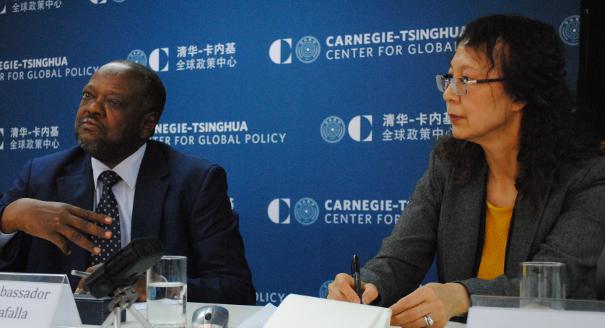Registration
You will receive an email confirming your registration.
The growing relationship between China and the African continent has sparked debate about existing development models and alternative methods of international development financing. China’s often high-risk but high-reward investments in Africa focus on infrastructure projects that address bottlenecks in the local economy. In contrast, the West focuses on concessional loans and aid in healthcare and education projects.
To discuss China’s role in African infrastructure construction and developing financing, Carnegie-Tsinghua’s Tang Xiaoyang hosted a panel discussion featuring Abdelgadir Dafalla, the Sudanese ambassador to China, Nicholas Agbo Ella, the minister counselor of the Embassy of the Federal Republic of Nigeria, Shantano Mitra, a representative of the United Kingdom’s Department for International Development, and Wang Yan, a visiting professor at George Washington University.
The China-Africa Development Model
- Chinese Investment Complements Traditional Donors: Mitra noted that since China has its own strengths as a development partner that differ from those of traditional Western donors, China and traditional donors should be able to work together in a complementary way.
- A South-South or Global Initiative? Wang emphasized the importance of the China-Africa relationship as an integral component of South-South cooperation, noting that China has utilized its own comparative advantage by investing in the platforms they know best: labor-intensive manufacturing and agriculture technology.
China’s Focus on African Infrastructure
China’s investment in African infrastructure has met local demands thus far left unfulfilled by domestic governments. Ella noted that certain governments within Africa lack the necessary resources to fully fund infrastructure projects and therefore look to development partners, like China, to close such funding gaps.
- Shortfalls in Infrastructure: Many sub-Saharan countries have little in the way of water and electricity infrastructure. Ella gave the example of Nigeria, where the current grid capacity generates less than six hours of electricity per person per day.
- Investment in Bottleneck-releasing Infrastructure: Wang emphasized the need to invest in bottleneck-releasing infrastructure in Africa, such as water, hydropower, and roads, in order to increase long term growth. These forms of investments have a high rate of return, he added.
- China’s Role in Infrastructure Development: Darfalla noted that China has financed over 34 percent of African infrastructure projects over the last decade, which is more than the infrastructure investment from all other donors. He listed a recent $700 million investment in a Sudanese power station and a $100 million sugar project in South Sudan as examples of China’s major role in this area.
Criticisms of China’s Development Financing Model
Common international criticisms of Chinese development financing in Africa include the lack of skill transmission, since Chinese companies often import their own labor to work on African projects. However, representatives of the Sudanese and Nigerian embassy refuted such accusations.
- Development Efforts Promote Global Stability: Investing in developing countries promotes stability and growth around the world, which is important for donor countries, Mitra said. He pointed out that Chinese banks are inherently set up to bear more risk, enabling China to go into resource-rich conflict zones.
- Inclusion of Local Personnel: Dafalla said that Chinese investment projects in Sudan were negotiated well. He added that Chinese companies do not compete with national companies, as Chinese projects are larger in scale. He noted that Sudan has benefited from working with Chinese companies in the oil sector: the number of Sudanese personnel in the field has grown from 5 percent to 65 percent due to Chinese investment.
- Improving China’s Role: Wang noted that China must continue to learn how to be a better development partner and improve transparency, organization, quality, and software. Mitra added that since China is often unfairly criticized in the international press, more knowledge and transparency about how China operates in developing countries will improve global understanding on all sides.
